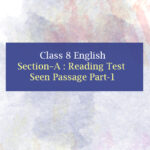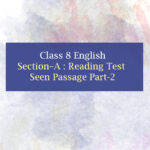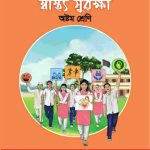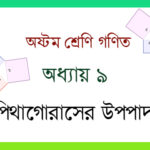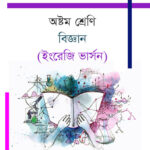Class 8 English Seen Passages (21-24)
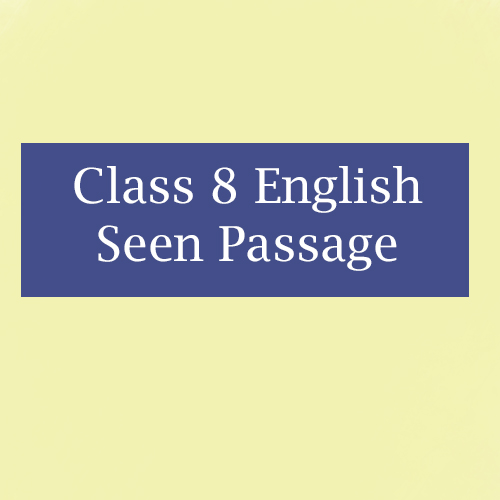
Read the text and answer questions 1, 2 and 3. (Unit–9, Lesson–06)
Communication of ideas is at the center of civilization. It needs written records. Most of our records in the modern age are on paper. Though writing was invented very early paper is a more modern invention. For a long in history, people exchanged ideas through speaking and listening. Then there came the art of writing. But to record thoughts in writing was difficult. Writing materials were not available. People used the surface of stone, metal, wood, bark, leaves, etc. for writing. Those things were not easy to carry. Then for ages, people looked for easy writing materials. Finally, Paper was invented in China in 105 AD. Before the paper age, knowledge was very restricted. Can you think of that time? There were very few books in the world. Maybe, they were written on stone or on heavy wood plunks or on metal sheets. Suppose, one page was a heavy stone block. So think of a hundred-page book! In our age, you can carry the entire world of knowledge in digital form in your laptop bag. You can even carry a huge volume of the paper encyclopedia. But who could produce and carry tons of heavy stone books and documents in those paperless days? In fact, the paper has made publication and the spread of knowledge and information easy. So you can see how the paper has changed our life.
Set 1
- Choose the best answer from the alternatives.
(a) Paper has ¾ to spread knowledge.
- helped ii. facilitated iii. hindered iv. hampered
(b) In the past, knowledge was very ¾.
- free ii. open iii. limited iv. available
(c) The invention of paper has changed our life ¾.
- slowly ii. drastically iii. gradually iv. by stages
(d) In earliar time it was ¾ to record thought in writing.
- very easy ii. less time consuming iii. tough iv. boring
(e) Which one was an early writing material?
- Type writer ii. Metal sheet iii. Paper iv. Laptop
- Answer the following questions in your own words.
(a) Why was recording thought in writing difficult?
(b) What was the main problem with early writing materials?
(c) How did people look for easy writing materials?
(d) How did people transfer ideas before writing was invented?
(e) How has paper changed our life?
- Summarize the above text in your own words (within 80 words).
Answer
- (a) (ii) facilitated; (b) (iii) limited; (c) (ii) drastically; (d) (iii) tough; (e) (ii) Metal sheet.
- (a) Recording thought in writing was difficult because writing material was not available.
(b) The main problem with early writing materials was that those things were not easy to carry.
(c) People used surfaces of stone, metal, wood, bark, leaves, etc. for writing. Those things were not easy to carry. So, people looked for easy writing materials.
(d) Before writing was invented, people transferred ideas through speaking and listening.
(e) Paper has changed our lives immensely.
- The communication of ideas has played a pivotal role in the advancement of civilization. Earlier people exchanged their ideas through speaking and listening and so knowledge was very restricted. Later, people used to write on the surface of stone, metal, wood, leaves, etc. But with the invention of paper, human civilization has advanced rapidly. Now, the entire world of knowledge can be carried in a digital laptop. However, the paper’s contribution can be very easily perceived.
Class 8 English Seen Passages
Read the text and answer questions 1, 2 and 3. (Unit–7, Lesson–04)
River gypsies in Bangladesh are having various problems. First, Bangladesh is getting urbanized very rapidly. Gypsy people are losing their customers in the urban population. Hence, their income is threatened.
Secondly, 24,000 kilometers of previous waterways, has shrunk into only 6,000 kilometers in the country in dry seasons. Scientists believe that Bangladesh will be the worst affected by global climate change. The unpredictable rain and drying out of rivers have made boat movement heavily restricted. Thirdly many river gypsies are changing their lifestyle in the context of changed reality. They are thinking of living permanently on land. The authority feels that river gypsies need help to survive in the mainstream population. Therefore, the government is offering voting rights, permanent housing, and bank-loan facilities. However, changes do not come overnight. Traditionally, river gypsies are used to water life.
They have inherited from their forefather’s necessary life skills to survive in waters. They have no education and training to adapt to mainstream modern society. So the authority feels the need to bring them under a formal education network. But they have no permanent living place. Gypsy children are born and brought up on roaming boats. Therefore, they cannot go to conventional schools. And hence, mobile boat schools are coming up for gypsy children. Some voluntary organizations are running special schools on boats to educate river gypsy children in some areas.
Set 1
- Choose the correct option.
(a) Bangladesh is ¾¾ very rapidly.
- becoming poorer ii. urbanizing iii. developing iv. shrinking
(b) What is the present status of the income of river gypsies?
- Increasing ii. Moderate iii. Threatened iv. Extravagant
(c) Their lifestyle differs from ¾¾ population.
- local ii. tribal iii. mainstream iv. gypsy
(d) What does ‘unpredictable’ mean?
- That can be said beforehand ii. That can be seen from a distant place
iii. Unforeseeable iv. That can be known beforehand
(e) Who are running mobile boat schools?
- Government ii. Foreigners
iii. The water gypsies iv. Some voluntary organizations
- Answer the following questions.
(a) Why are gypsy people losing their customers?
(b) What has heavily restricted their boat movement?
(c) What have they inherited from their forefathers?
(d) Why have they not got any formal education?
(e) What is a mobile boat school?
- Summarize the above passage in around 60 words.
Answer
- (a) (ii) urbanizing; (b) (iii) Threatened; (c) (iii) mainstream; (d) (iii) Unforeseeable; (e) (iv) Some voluntary organizations.
- (a) Gypsy people are losing their customers because of the increase of the urban population.
(b) The unpredictable rain and drying out of rivers have made boat movement heavily restricted.
(c) They have inherited their forefathers’ necessary life skills to survive in waters.
(d) They have not got any formal education because they have no permanent living place.
(e) A mobile boat school is a special kind of school on boats to educate river gypsy children in some areas.
- River gypsies mainly known as bedey and having their own lifestyle and culture prefer to live on the river banks. They never stay in the same place for a long time. They earn their livelihood by fishing or collecting pearls. But in the dry season, they return to the mainland. Then the men entertain people with snake-charming and the women go from door to door to sell cosmetics and other things. Many villagers believe that they can remove evil spirits from someone’s body by magic or special powers.
Class 8 English Seen Passages
Read the text and answer questions 1, 2, and 3. (Unit–6, Lesson–07)
The plane landed at Suvarnabhumi Airport at 4.55 p.m. The name ‘Suvarnabhumi’ is pronounced as “su-wan-na-poom”. The name is derived from Sanskrit, which means golden land. The name was chosen by King Bhumibol Adulyadie. The airport is located in Racha Thewa in the Bang Phli district of Samut Prakan province, 30 kilometers east of Bangkok. The airport has two parallel runways. Both of them are 60 meters wide. One of the runways is 4000 meters long and the other is 3,700 meters. It can handle 76 flight operations per hour. It can handle 45 million passengers and 3 million tonnes of cargo per year. The airport passenger terminal is 563,000 square meters which are, 6,060,000 square feet. It is the fourth biggest passenger terminal building in the world.
The airport is going through phase 2. It will raise its capacity to handle 65 million passengers per year. The airport has two 5-story car park buildings. The buildings can house 5000 cars.
Set 1
- Guess the meaning of the following words and choose the correct meaning closest to the text.
(a) raise
- decrease ii. increase iii. demolish iv. grow
(b) derive
- get ii. profit iii. gain iv. achieve
(c) chosen
- liked ii. disliked iii. selected iv. supported
(d) house
- collect ii. gather
iii. a place which accommodates things or people iv. prepare
(e) Wide
- long ii. short iii. broad iv. high
- Answer the following questions.
(a) How many runways does the Suvarnabhumi airport have?
(b) What is the meaning of Suvarnabhumi?
(c) After development phase 2 how many an additional passengers will the airport be capable of handling?
(d) Locate the Suvarnabhumi airport.
(e) How many airports are there in the world bigger than Suvarnabhumi airport?
- Summarize the above passage in around 50 words.
Answer
- (a) (ii) increase; (b) (i) get; (c) (iii) selected; (d) (iii) a place which accommodate things or people; (e) (iii) broad.
- (a) The Suvarnabhumi airport has two parallel runways.
(b) The meaning of Suvarnabhumi is golden land.
(c) After development phase 2, the airport will be capable of handling 65 million passengers per year.
(d) The airport is located in Racha Thewa in the Bang Phli district of Samut Prakan province, 30 kilometers east of Bangkok.
(e) There are three airports in the world bigger than Suvarnabhumi airport.
- At 4.55 pm the plane landed at Suvarnabhumi which is pronounced as “Su-wan-na-poom” meaning golden land. It is 30 kilometers east of Bangkok. The airport has two parallel runways, both of which are 60 meters wide. Its passenger terminal is the fourth biggest passenger terminal building in the world.
Class 8 English Seen Passages
Read the text and answer questions 1, 2 and 3. (Unit–6, Lesson–09)
It was Sunday. Mita, Zara, Jhuma Islam, and Mazharul Islam woke up very early. They quickly got ready and started for Tha Kha floating market. They planned to have breakfast at the market. They reached the marketplace sharp at 7. The canals were surrounded by coconut palm trees.
They hired a boat. The boatman started to row slowly taking them to the center of the market.
There were boats everywhere. The sellers were mainly elderly Thai women. Their small boats were laden with bundles of lotus flowers, farm-fresh coconuts, fruits, vegetables, local food, and delicious sweets. The sellers and buyers rowed their boats slowly. The sellers displayed their goods for sale and the buyers chose their pick. They could have a little chit-chat as buying and selling were going on.
Set 1
- Choose the best answer from the alternatives.
(a) They reached the market at ¾¾.
i 7 a.m ii 7 p.m iii. 6 a.m iv. 6 p.m
(b) Mita had ¾¾ companies on the visit to Singapore.
- one ii. two iii. three iv. four
(c) The sellers were mainly ¾¾.
- men ii. women iii. boys iv. girls
(d) Ôdelicious‘ means ¾¾.
- pleasant ii. enjoyable iii. very tasty iv. tasty
(e) They could have a little chit-chat. Here underline word means ¾¾.
- buying ii. selling iii. talking iv. moving
- Answer the following questions.
(a) Why did they hire a boat?
(b) What did they plan?
(c) Who was the boatman?
(d) When did they reach the market?
(e) Where did they take their breakfast?
- Summarize the above passage in around 50 words.
Answer
- (a) (i) 7 a.m; (b) (iii) three; (c) (ii) women; (d) (iii) very tasty; (e) (iii) talking.
- (a) They hired a boat to visit the Tha Kha floating market.
(b) They planned to have breakfast at the market.
(c) The boatman was a local Thai man.
(d) They reached the marketplace sharp at 7.
(e) They took their breakfast at the market.
- Getting up from bed early in the morning on Sunday, Mita, Zara, Jhumona Islam, and Mazharul Islam reached the Tha Kha floating market at 7. There were boats everywhere that were laden with bundles of lotus flowers, farm-fresh coconuts, fruits, vegetables, local food, and delicious sweets. They had a friendly chat while selling and buying were going on.
Class 8, Class 8 English, class 8 English seen passages, seen passages
Class 8 English Seen Passages (21-24)



